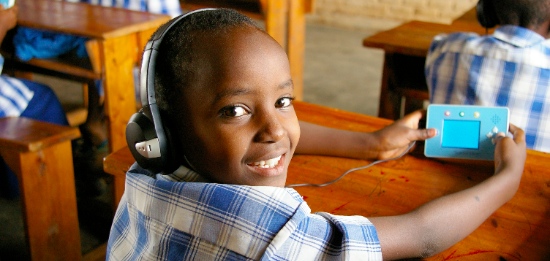OLE Rwanda is tripling literacy test scores with Teachermates
I am Richard Rowe and I have, for the first time that I am aware of, valid and reliable evidence of substantial improvements in basic literacy in a developing country over a short period of time, at a scalable cost, directly related to the introduction of a technology-supported learning system.
I have in many ways been a techno-skeptic when it comes to the short-term potential of low-cost ICT to help basic education in developing countries. Looking for the evidence. But this is a case where it has been done right with surprising results.
Here is the story
Open Learning Exchange in Rwanda has been conducting a pilot study of the TeacherMate Differentiated Learning System with 620 students in one school. The project included setting up control groups and pre- and post-testing students employing the standardized test of English literacy developed by USAID/RTI for Rwanda. We have just received the project report.
The results are remarkable
The TeacherMate students had nearly triple the increases in literacy test scores compared with two different control groups (an average 36% increase in scores compared with 14% in each of the control groups). This is all the more impressive for a variety of reasons.
The TeacherMate students had roughly one quarter of the time with the TeacherMate devices that we had recommended – averaging only 40 minutes per week instead of the 100 minutes we had hoped for. In addition, the teachers had no previous experience with ICT and they used the TeacherMate system for less than the full school year.
The TeacherMate device we used is in the $50 range per unit. We have done a rough calculation of the amortized cost of the program and have estimated it as less than $5 per student per year. This begins to be an effective approach that can scale quickly to a great many places.
The TeacherMate Differentiated Learning System involves a total systems approach, not just one piece of the challenge. The Rwanda project included content aligned with the curriculum, high levels of interaction and frequent performance feedback for students, the Classroom Management System for teachers that supported their customizing the learning process of each student and the hardware that enabled this to happen.
The next steps
As a result of this success OLE is working with Innovations for Learning to expand the TeacherMate program in Africa. We are hoping to introduce pilots in Uganda and Ghana in addition to continuing in Rwanda. Kari Mruz, the Rwanda Project Manager, has agreed to continue as the director of this multi-national expansion so we will have continuity of management. This second stage pilot will involve using iPod touch devices for students and teachers in a school that has some access to the Internet. This will enable us to use the IFL Classroom Management System to track student progress wirelessly and to support from a distance the coaching of teachers throughout the school year. We will also be exploring the effects of increased home use. We are looking for financial support for this next stage.
Ringing the School BeLL
Aligned with this project, our School BeLL program (Basic e-Learning Library) is now being deployed in Rwanda, Uganda and Ghana. I keep thinking that such a low cost open digital library might be quite useful in some development programs that reach beyond basic education. We will be linking the BeLL to the TeacherMate in Ghana, using e-Grainery and other things to open up a much broader range of content for the students. You can see the “Dream” about how it can change lives and villages on our website.
Here is the full report for you to review and comments. Please feel free to circulate the report to those you believe will find it of interest and let me know of any suggestions you have about getting additional support for this approach.

